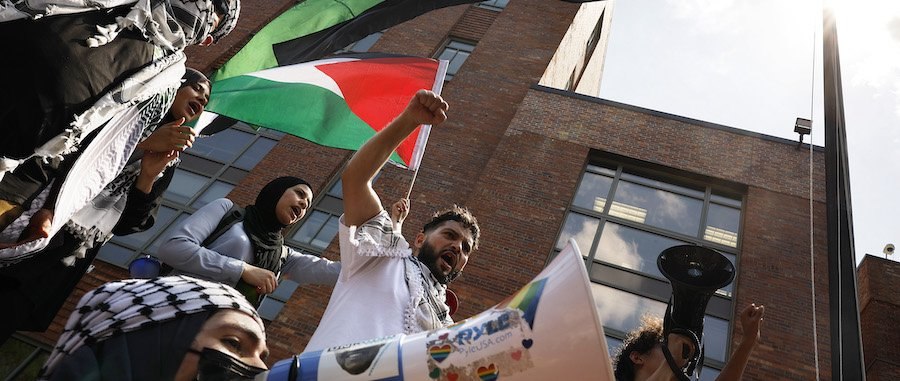Three-quarters of Americans have heard about the recent arrests of pro-Palestinian protesters demonstrating on college campuses throughout the country. Nearly half of people oppose the protests, while around one in four support them. Few support demonstrators' calls for divestment, and one in three believe college administrators have not responded harshly enough to the protesters.
Americans are more likely to strongly or somewhat oppose (47%) than support (28%) pro-Palestinian protesters on college campuses throughout the country in recent weeks, according to a YouGov poll this week of 9,012 U.S. adults. American Muslims support the protests by 75% to 14%; Jewish Americans, however, oppose them by 72% to 18%. Adults under 45 are twice as likely as older adults to be in favor of the protests (40% vs. 19%).
The most recent Economist/YouGov Poll found that 30% of Americans believe that most or all of the pro-Palestinian campus protesters have been peaceful, while slightly more — 35% — say some or none of them have been. 29% are unsure.
A growing number of students have been arrested, leading some to question whether administrators who allowed these arrests have overstepped. Others argue that even more force should be used. Our survey shows that twice as many Americans believe college administrators have not responded to the protests harshly enough (33%) as say administrators' response has been too harsh (16%). 20% say it has been about right and 31% are not sure. Half of Americans 45 and older believe administrators haven't been harsh enough (48%); a much smaller share of adults under 44 think this (16%).
Most Americans (58%) believe that colleges have different standards for groups protesting on their campuses; just 12% believe that college administrators treat all groups equally.
The demonstrations have raised questions about how universities should balance the tension between protecting free speech and preventing hate speech. Half of Americans say colleges should balance the two goals equally, while 23% say they should prioritize free-speech protections and 15% say the prevention of hate speech should be the bigger focus.
Some pro‑Palestinian student protesters have demanded that universities sell their investments in companies with ties to Israel. Brown University administrators reached a compromise with student protesters this week, agreeing to a board vote on possible divestment if the protester encampment ends. Many Americans aren't sure about the fairness or feasibility of divestment. 40% believe it would be unjust for universities to divest from Israeli ties, while 25% say it would be just. Only half of those who think it would be just for universities to divest also believe that it would be feasible for them to do so.
While few Americans say divestment would be just, more believe that Israel's response in Gaza has been too harsh (30%) than say it has been not harsh enough (15%). 22% say it has been about right. In terms of where Americans' sympathies overall lie in the Israeli-Palestinian conflict, 31% say more with the Israelis, 17% more with the Palestinians, and 28% with both sides equally.
— Carl Bialik and Kathy Frankovic contributed to this article
Methodology:
- The Daily Questions survey was conducted online on May 1 - 2, 2024 among 9,012 U.S. adults. The sample was weighted according to gender, age, race, education, U.S. census region, and political party.
- Do you support or oppose recent pro‑Palestinian protests on U.S. college campuses?
- Do you think the way college administrators have responded to pro‑Palestinian campus protests has been…?
- Some pro‑Palestinian student protesters have called for colleges to sell their investments in companies with direct or indirect ties to Israel. Do you think that selling these investments would be…?
- The Economist/YouGov survey was conducted online on April 28 - 30, 2024 among 1,755 U.S. adult citizens. Respondents were selected from YouGov’s opt-in panel using sample matching. A random sample (stratified by gender, age, race, education, geographic region, and voter registration) was selected from the 2019 American Community Survey. The sample was weighted according to gender, age, race, education, 2020 election turnout and presidential vote, baseline party identification, and current voter registration status. Demographic weighting targets come from the 2019 American Community Survey. Baseline party identification is the respondent’s most recent answer given prior to November 1, 2022, and is weighted to the estimated distribution at that time (33% Democratic, 31% Republican). The margin of error for the overall sample is approximately 3%.
Related:
- Most Americans are OK with protests involving flyers and petitions. Blocking traffic? Not so much
- Americans are more likely to accept most protest tactics when the protest is for a cause they like
Image: Getty









